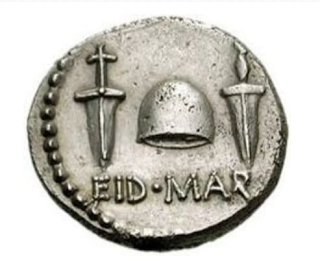The Ides of March
The Ides of March is the 74th day in the Roman calendar, corresponding to 15 March. It was marked by several religious observances and was notable for the Romans as a deadline for settling debts. In 44 BC, it became notorious as the date of the assassination of Julius Caesar which made the Ides of March a turning point in Roman history.
Caesar was stabbed to death at a meeting of the Senate. As many as 60 conspirators, led by Brutus and Cassius, were involved. According to Plutarch, a seer had warned that harm would come to Caesar on the Ides of March. On his way to the Theatre of Pompey, where he would be assassinated, Caesar passed the seer and joked, "Well, the Ides of March are come", implying that the prophecy had not been fulfilled, to which the seer replied "Aye, they are come, but they are not gone."
"Et tu, Brute?"is a Latin phrase literally meaning "Also you, Brutus?", often translated as "You too, Brutus?". The quote was made famous by William Shakespeare in his play Julius Caesar, where it is spoken by the Roman emperor at the moment of his assassination, to his friend Brutus, upon recognizing him as one of the assassins. The phrase is often used apart to signify an unexpected betrayal by a friend.
The image shows the reverse side of the Ides of March Coin issued by Caesar's assassin Brutus in the autumn of 42 BC, with the abbreviation EID MAR (Eidibus Martiis – on the Ides of March) under a cap of freedom between two daggers.



Comments
Post a Comment